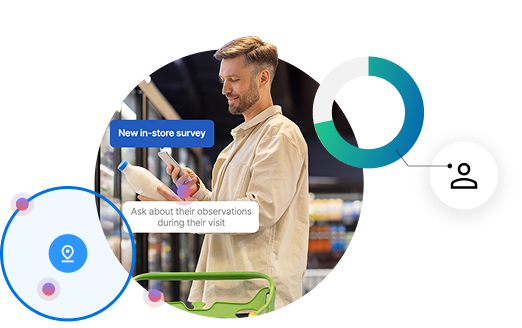Advertising is an essential marketing activity that helps drive interest and demand for any product or service, and it’s critical to get the ad concept and creative right. According to a recent Facebook study, the quality of your creative determines 75% of impact, as measured by brand and ad recall. However, knowing what messages and imagery will intrigue your target buyer – then where to activate ads for maximum visibility and impact – is a challenging puzzle to solve, with many pieces and variables that must come together seamlessly.
To optimize their ads, many companies conduct ad testing, a form of market research that enables advertisers to try out ad concepts and creative on their target audiences prior to launching a campaign. The results of the tests can help to improve ROI on advertising efforts.
But not all ad testing is effective. According to Alex Colao, EVP of Sales at mobile market research firm MFour, advances in data collection is making it possible to test ads using the same consumer behaviors advertisers harness when activating campaigns. In a recent interview, Colao explains how MFour’s new Ad Testing product offering helps companies leverage behavioral data and flexible ad testing methodologies to gather valuable feedback about ad concepts before launching an advertising campaign.
Q. What is MFour Ad Testing?
Colao: Throughout our 12-year history, we’ve been testing ads for clients. Ad Testing is a new templated product offering from MFour that gives our customers unprecedented insights into the reactions of their target consumers to new ad concepts and activation strategies before they launch a campaign. Our clients have been testing ads with surveys, then using behavior-driven audiences on programmatic platforms to place them for roughly a decade.
By leveraging behavior data targeting and data appends, we can provide clients with more representation in their data than other ad testing products on the market while decreasing the cost and turnaround time for clients. Self-service and full-service options are available to meet clients’ different reporting needs. Not only is this templated approach faster, it’s more cost-efficient and equally effective. It’s a proven, repeatable ad testing strategy that gives clients their data faster and less expensively while adding innovative behavioral insights.
Q. What benefits does MFour Ad Testing provide?
Colao: Our Ad Testing product combines data science with traditional survey research techniques to make testing ads more representative of how advertisers place them. Key benefits include speed, representation, and pricing. We’ve created a templatized, repeatable process, so our clients can launch tests quickly and get results about 5X faster than they would with other solutions.
Since our surveys are delivered via our Surveys On The Go® mobile app, our consumer panel is more representative of the U.S. population – it includes consumer segments that other panels don’t typically cover. We reach members of diverse communities as well as younger consumers – people who may not be accustomed to receiving and responding to surveys the traditional way, via email. By leveraging a more modern, universal communication platform, we can reach consumers across the full range of demographics, not just the Caucasian older white female consumer who checks her email throughout the day. The solution can be self-service, which helps to reduce overall costs, as well.
Q. One feature of MFour Ad Testing is differentiated targeting. What is it and why is it important for advertisers looking to test their ads?
Colao: Differentiated targeting is the process of selecting survey participants based on the behaviors they’ve exhibited over time. Say, for example, you’re a company that owns movie theaters and you want to test an ad promoting a movie that you’re running. There’s no point in testing your movie ad on people who never see movies in theaters because they’re not part of your target audience. Thanks to our mobile app, we know which consumers on our panel like to see movies in theaters, based on the behavioral data we’ve gathered. We can create a list of survey recipients who have gone to the theater at least three times over the past three months, so the survey delivers much more accurate and relevant results.
Q. What are data appends, and how do they enhance results?
Colao: Data appends help our customers optimize ad activation. Basically, we take survey results and append the data with additional behavioral data to help clients drill down and understand the specifics of their target audience, so they can refine their activation strategies and improve their success. Say you run an ad test and find that 80% of the population surveyed loved the first of two ads. Clearly, that’s the ad to use. However, of those 80% that loved the ad, how many were under the age of 40? Were they mostly male or female? What apps, websites, and physical places do they visit most often? This information is critical to successful activation – you want to be sure you’re placing ads where people who are likely to respond in a positive way will actually see them. Data appends enable a deeper level of understanding about target consumers that are extremely useful for making decisions around activation, partnerships, and promotions.
Q. Does MFour support multiple testing methodologies?
Colao: Yes. We offer multiple methodologies and service options for deploying Ad Testing. In terms of methodologies, we support both sequential and monadic testing. In sequential testing, a single test subject – one person – evaluates different ads in succession. In monadic testing, more than one demographically similar person is asked to evaluate one of multiple ad variations in isolation. Experts argue over which method is best, but we take a neutral approach and let our customers decide. For both methodologies, we cover self-service and full-service options; clients either leverage templated questionnaires and receive response-level raw data in an SPSS or Excel file, or they can choose to have our experts analyze the data and deliver findings and recommendations in a PowerPoint deck. Our goal is to provide as much flexibility as possible to meet our clients’ needs.
Q. How can a client or someone new to MFour get started with MFour Ad Testing?
Colao: A good place to start is to learn about our platform on our Ad Testing page and read up on why behavioral data is critical to effective market research. Or, they can also reach out to us directly for a product demo by filling out a short form on our contact us page, and we’ll walk them through how they can leverage Ad Testing to increase the ROI of their advertising campaigns.




